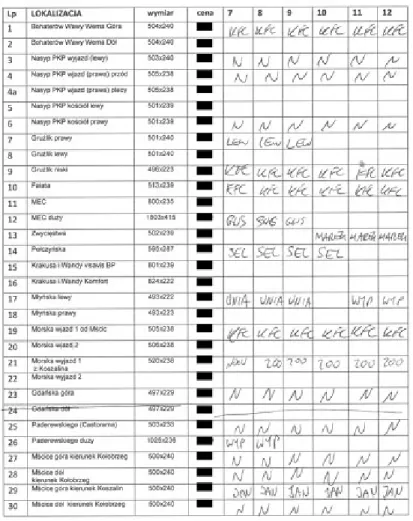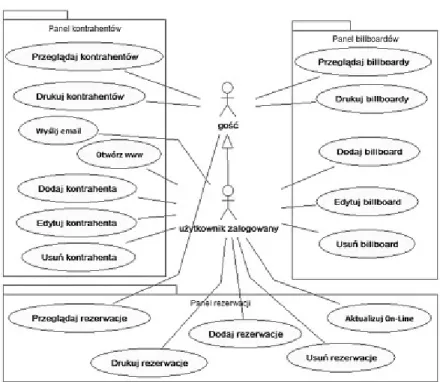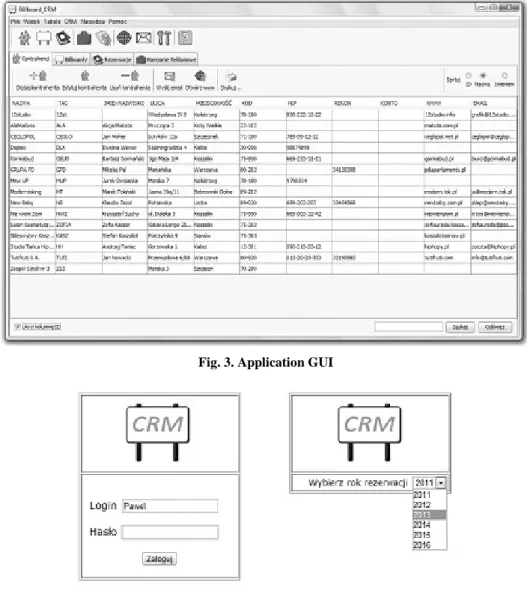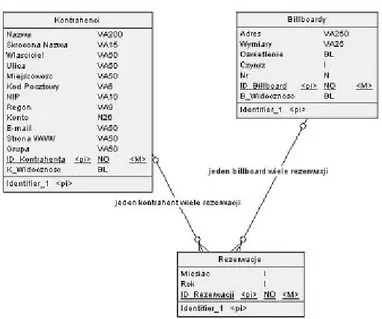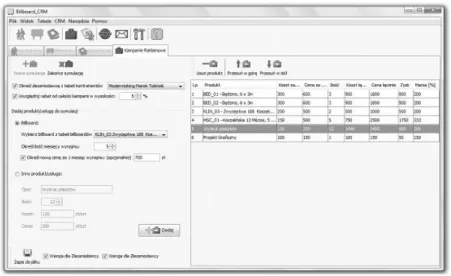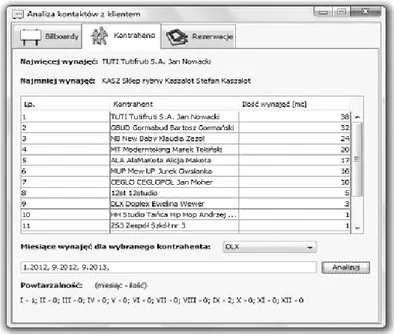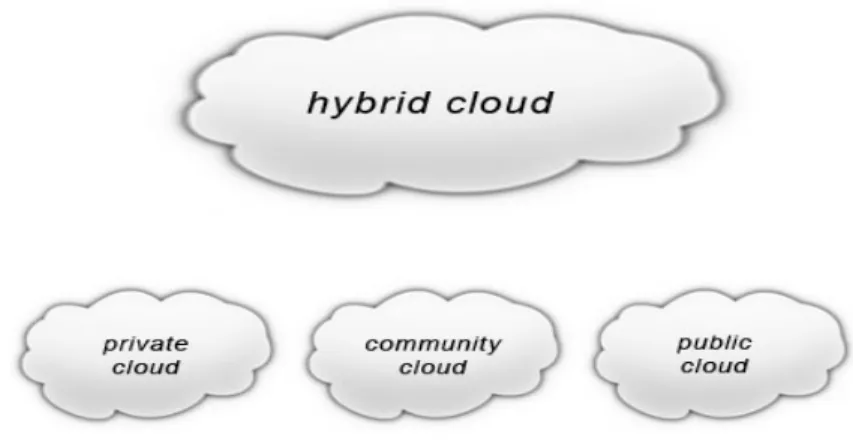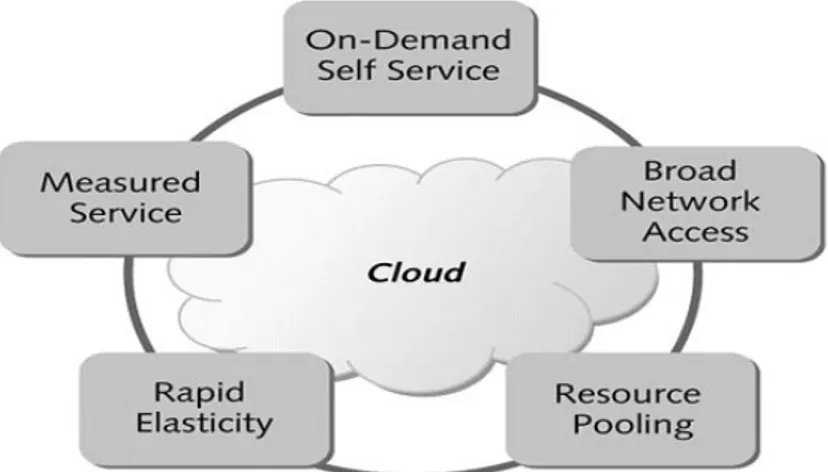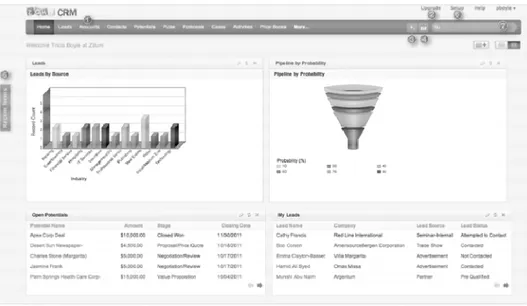33 advertising company, billboard, customer relationship management, cloud computing, software as a service,
Radosław URBA
Ń
SKI
*LOCAL CRM APPLICATION FOR BILLBOARD
ADVERTISING COMPANY
Abstract
The article presents development process of dedicated application that supports Customer Relationship Management. The software receiver is a small advertising company, whose main service is renting billboards. Implementation of CRM system inclines to further expansion of the application Transfer of implemented system into area of Cloud Computing is considered.
1. INTRODUCTION
Technological progress forces searching for solutions that improve company’s functioning as well as its customer service. Available applications aren’t often sufficient for enterprises which work in personal, individual business processes. This situation causes development of IT systems dedicated to specific requirements.
The subject analyzed here is a small advertising company, whose main service is renting billboards. Marketing Department and company executives get contractors. Negotiations proceed in the office of the firm or in the headquarters of their trade partner. Preliminary agreements and advertisement booking are made at meetings. Booking has a form of A4 paper sheet (Figure 1) with table that contains billboards description, booking months and prices. This reservation system isn’t perfect. It occasionally happens that no one has time to copy booking sheet and a marketing or management employee takes it away, which causes the loss of important data. There are situations when there is a need to get remote information about actual reservation status, but no one can make that accessible (for example office is closed).
*
Koszalin University of Technology ul. Śniadeckich 2, 75-453 Koszalin, Poland; tel. +48 94 34 78
34
The first part of the article is a response to advertising company demands for Customer Relationship Management system. In the second part the issue of the use of new technologies and estimation the potential benefits arising from the implementation of suggested solution is considered.
Fig. 1. Reservation sheet
1.1. Popular CRM software overview
Existing solutions such as “ProfitCRM”, „Asystent CRM” or „Enova Firma” include extended base of products and contractors data. Systems have many
35 modules supporting customer service, but do not allow products (billboards) reservation. Modules containing calendars and reminders allow to book products, but it is a too time consuming and inconvenient solution. The amount of unnecessary modules is another factor speaking for implementation of dedicated software, containing only necessary functions.
1.2.Problem statement
Presented here is the advertising company whose main service is renting billboards. Their requirement is to produce software that allows advert booking along with the possibility of continuous and remote access to data. The application must be independent from the operating system. The company has a limited budget, so there is a need to select the cheapest solution. The following question is considered:
Whether using available information technology is possible to design a system that supports customer relationship management referring to their business processes and to meet their expectations?
2. DEVELOPING DEDICATED CRM SOFTWARE
The first issue is to identify the area of the company, for which the system is designed. The service included in the project is booking billboards. An office employee cataloged the list of current adverts and customers. Rental of billboards is possible up to 3 years from the date of signing the agreements, due to the uncertainty of lease and rates volatility.
36
Fig. 2. Use case diagram of system main functionality
Assume that the system is a local application installed on one computer with the internet connection. Online module is placed on hosting provider server (the same where company website is placed). As a result of consultations with the executives, office workers and marketing department the functionality of the system in the form of use case diagram is defined (Figure 2).
The diagram provides the basis for acceptance of the system by the company. The most popular object-oriented programming language that meets the requirements for local application is Java [1]. For online module appropriate language is PHP that allows the display of tabular data and user login [2]. Both Java and PHP are available as free programming languages along with free programming environments and independent platforms that enable the implementation of the planned functionality.
Local application graphic user interface is designed in NetBeans IDE with Swing components (Figure 3). Online module is composed with HTML forms (Figure 4).
37
Fig. 3. Application GUI
Fig. 4. Online reservation view forms
The basis for the implementation of the application is to design a database for writing and reading data in cooperation with the interface. Relationship database model is designed in Sybase “Power Designer” (Figure 5). The database consists of five entities. Three of them contain attributes identifying customers, billboards and reservations. Two other entities contain logins and passwords.
38
Fig. 5. Contractors, billboards and reservation entities
In order to improve the work of implementation, it is found that some functionality is depended on the other. In the first place the most important modules are designed, as others depend on them.. The first a reservation module (with contractors, billboards and reservation tables), next in random order are online reservation view module, contacts analysis and advertising campaign simulation module.
The reservation module is the most important system element, which allows users to write data of products, clients and reservations. Relating to use case diagram (Figure 2) contractors tables contain functions:
- View contractors table - Add new contractor data - Edit existing contractor data - Delete existing contractor data
- Open selected contractor website in browser - Send email to selected contractor
- Print contractors table
Billboards table contains functions: - View billboards table
- Add new billboard data - Edit existing billboard data - Delete existing billboard data - Print billboards table
39 Reservation table presents rental year selected by the dropdown list. The first three columns contain the data from the billboards entity (symbol, address, and dimension). The next columns are the reservation months. Reservation table functions are:
- View reservation table - Add new reservation - Delete existing reservation - Update online reservation data
The element that distinguishes the designed application from other programs is the use of modules suited to the needs of the advertising company. These modules are an advertising campaign simulation and the analysis of customer contacts.
Fig. 6. Advertising campaing simulation window
The advertising campaign simulation is a tool for office workers to calculate profits and losses of the billboard campaign. The user is able to determine the amount of billboards (or other products), prices, rental period (Figure 6). Campaigns can be saved to text files in two versions – for the company and for their client (Figure 7).
40
Fig. 7. Advertising simulation campaign text file output
The analysis of the contact with the client consists of a window divided into three panels: billboards, contractors and reservations (Figure 8). Each panel displays statistics associated with rental of billboards by contractors.
41 Tests of designed system allowed the detection of some errors. Sample CRM system errors that are detected and eliminated:
- view another booking year than selected in dropdown list, - not including the rebate on the advertising campaign simulation, - wrong assigned menu items to their functions.
Implementation of the finished CRM system to company is divided into few processes:
- PostgreSQL Database Management System installation, - Java Development Kit installation,
- CRM system installation (on PC),
- online reservation view module installation (FTP account), - application startup and configuration,
- database fill with billboards and clients data, - company personnel training of system usage.
Successful implementation of CRM system inclines executives and company employees to consider further expansion of the application. The company constantly develops, increases number of billboards and workers operating reservation system. Company executives are considering the possibility of integrating CRM with applications to create contracts and a financial and accounting system. Frequent problems with hardware failures put the company on additional costs because reinstallation of the CRM system is needed.
The following question arises: is there a technology that meets the rising requirements of the client and that reduces costs and time of system reinstallation and updates? There is such technology and it’s Cloud Computing.
3. DESCRIPTION OF CLOUD COMPUTING
Cloud Computing refers to applications and services offered over the Internet. These services are offered from data centers all over the world, which generally are referred to as the "cloud" [3]. The idea of CC simplifies many network connections and computer systems involved in online services. Users with an Internet connection can access the cloud and the services it provides. Since these services are often connected, users can share information between multiple systems and with other users. Cloud Computing includes (e.g.):
- online backup, - social services,
- personal data services, - online applications,
42
- hardware services, - mirrored websites.
Cloud Computing contains service models (Figure 9), deployment models (Figure 10) and five essential characteristics (Figure 11). Three CC service models:
- Software as a Service - cloud users could access an applications through network, not requiring installation and running software on their computers,
- Platform as a Service - for cloud developers to rent hardware, operating systems, storage and network capacity, allows the customer to rent virtualized servers and associated services for running existing or developing applications and testing new ones [4],
- Infrastructure as a Service - is a model in which the cloud provider rents the IT equipment like storage, hardware, servers and networking components [5].
Fig. 9. Cloud Computing service models
Deployment models of CC [6]:
- private cloud - infrastructure is operated solely for an organization and it may be managed by the organization,
- community cloud - infrastructure is shared by several organizations and supports a specific community that has shared concerns,
- public cloud - infrastructure is available to the general public or a large industry group and is owned by an organization selling cloud services,
43 - hybrid cloud - infrastructure is a composition of two or more clouds
(private, community, or public).
Fig. 10. Cloud Computing deployment models
Five essential characteristics of Cloud Computing (Figure 11) [7]:
- on-demand self-service - CC clients can self-control computing capabilities, such as server time or network storage,
- broad network access - capabilities are available over the network and accessed through standard mechanisms like client applications,
- rapid elasticity - capabilities can be rapidly and elastically provisioned (in some cases automatically) to quickly scale out and rapidly released to quickly scale in, depending of customer requirements,
- resource pooling - the provider’s computing resources are pooled to serve multiple consumers. Different physical and virtual resources are dynamically assigned and reassigned according to consumer’s demand, - measured service - cloud systems automatically control and optimize
44
Fig. 11. Cloud Computing characteristics
4. CRM SOFTWARE IN CLOUD COMPUTING
According to GetApp.com CRM’s are the most frequently purchased business applications available in Cloud Computing [8]. The most popular is “Zoho CRM” which is provided in 3 editions [9]:
- free edition – for 3 users, 100000 records, free to use,
- professional edition – unlimited users and records, additional features, subscription for 12$/month,
- enterprise edition – available all features for unlimited users, subscription for 25$/month.
“Zoho CRM” gives the ability to customize modules to the needs of the customer from the administration panel. Application includes panels (e.g.) of products, contractors, campaigns, orders or reports. Combining calendar with contractors and products gives the possibility to reserve adverts. Graphical user interface (Figure 12) is simple and intuitive to use. “Zoho CRM” only requires a Web browser installed on any operating system.
45
Fig. 12. “Zoho CRM” home page
The use of available on the market SaaS application by the advertising company is an option, but the main issue is that advert booking system is too complicated. Office workers and company’s executives are accustomed to actual booking system. Transferring designed local application with well known reservation module to Cloud Computing is considered.
5. MANUFACTURED CRM SYSTEM AS A CLOUD COMPUTING SOFTWARE
Chapter 2 describes the stages of manufacturing of a local application with online module for small advertising company. Chapters 3 and 4 describe Cloud Computing technology and capabilities of the selected CRM. Now consider the impact on the company using the CRM system as the service provided remotely via Cloud Computing and SaaS model.
Direct transfer designed local CRM to SaaS model from a technical point of view is not possible. Cloud Computing and SaaS model requires the use of technology for Web applications, for example PHP, ASP.NET Java EE [2], [10], [11]. Developing CRM application for SaaS model can be based on requirements analysis (company business processes haven’t changed) or graphic user interface (graphic elements like images and icons move to the Web application, reproduce the layout of the interface components). Online
46
reservation view module is redundant in this case, the user has a remote access to full application functionality.
The benefits for the advertising company using the CRM application in the cloud:
- accessibility - many users can simultaneously use the application through multiple devices (computers, laptops, smartphones)[12],
- reduce spending on technology infrastructure in case of new systems extensions (CC scalability),
- employees of the Marketing Department can make simulations of advertising campaigns directly at customers’ headquarters,
- the booking data are constantly updated,
- accessing the SaaS CRM system requires only a device with internet browser [12].
Mentioned benefits are for implementation CRM system into SaaS model, but there are some risks [13]:
- security, - data leakage, - data loss,
- CC provider viability.
Security and data leakage are risks not only for SaaS model application, but also for not carefully used local application. Cloud Computing provider viability and data loss are the biggest drawbacks against the SaaS model implementation.
6. SUMMARY AND CONCLUSIONS
Designed and implemented application matches the current requirements of the advertising company. The application can be classified as a CRM system, as it provides the necessary tools to make customer service better and faster. Individual booking system together with online view module has allowed for the computerization of work and move away the paper sheets. Due to the need for implementation of the new requirements a transition from a local application to the web application is planned. That transition would solve some technical problems and reduce costs.
The benefits of sharing Software as a Service can greatly reduce the production of local applications. The direction in which IT moves shows that a significant number of the programming companies begin to produce software in Web technologies compatible with Cloud Computing. Manufacturing
47 applications in SaaS model instead of the local application is an option that allows to adapt better to increasing customers requirements.
REFERENCES
[1] HORSTMANN, C. S. (2009). Java Podstawy. Gliwice: Helion.
[2] NARAMONE, E. (2005). PHP 5, Apache i MySQL od podstaw. Gliwice: Helion. [3] http://www.techterms.com/definition/cloud_computing
[4] http://searchcloudcomputing.techtarget.com/definition/Platform-as-a-Service-PaaS [5]
http://searchcloudcomputing.techtarget.com/definition/Infrastructure-as-a-Service-IaaS
[6] http://ayurveda.hubpages.com/hub/Cloud-Computing-Overview
[7] MELL P., GRANCE T. (2009). Draft NIST Working Definition of Cloud Computing.
[8] http://www.getapp.com/top-apps
[9] http://www.zoho.com/crm/help/understanding-zohocrm.html
[10] KIESSIG, R. (2009). Ultra-Fast ASP.NET: Build Ultra-Fast and Ultra-Scalable web sites using ASP.NET and SQL Server. New York: Apress.
[11] HEFFELFINGER, D. (2010). Java EE 6 with GlassFish 3 Application Server. Birmingham: Packt Publishing.
[12] Trumba Corporation.(2007). White paper: Five benefits of SaaS.
[13] CATTEDDU D. (2010). Cloud Computing: Benefits, Risks And Recommendations For Information Security.
